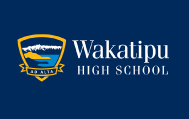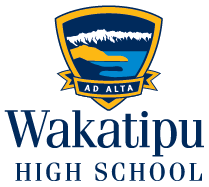The key philosophies behind Wakatipu High School’s timetable are...
student choice that supports learning, progress and achievement.
The New Zealand Academic Year
- The New Zealand school year runs from January to December and consists of four terms, or two semesters.
- Students have a two-week holiday between each of the first three terms, followed by a six-week holiday at the end of the year.
- Junior students (Years 9 and 10) select 12 classes per year - six courses in Semester one (Terms 1 and 2) and six in Semester two (Terms 3 and 4).
- Senior students (Years 11-13) select up to six classes per year - with each course running the whole year.
- Time for each class totals seven and a half hours over a two-week period with three 60-minute and three 90-minute periods over that two week period. See sample timetable.
- Ako time is an opportunity for students to meet with their Kaiārahi (learning advisors) for academic guidance and support. Ako time also provides students with some time to work independently.
- In Term 3 Senior students have Mock Exams to evaluate their understanding of the subject matter, and to identify areas of strength and weakness to further prepare for NCEA exams in November.
- For senior students official class time ends at the end of October, or beginning of November. Students then have a few days of exam preparation time before NCEA exams which take place through the month of November.
- Junior students have classes and exams through to Prizegiving in December.
- Year 10 students participate in the week long Branches Camp in second half of November, and Year 9 students participate in the 3-day Greenstone Camp in March.
National Certificate of Educational Achievement (NCEA)
Wakatipu High School offers the National Certificate of Education Achievement (NCEA).
- Think of NCEA as New Zealand's official high school certificate. It's run by a government organization called NZQA (New Zealand Qualifications Authority).
- NCEA is well-known by employers and universities, both here in New Zealand and in other countries like the United States, Britain, and Australia.
- It includes a special qualification called University Entrance (Level 3), which many universities around the world recognize.
- There are three levels of NCEA, from easier to more challenging, which students usually work through in their last three years of high school (Years 11-13).
- Whether you choose to take the final NCEA exams at the end of the year or not, WHS expects all of our international students to complete all of their regular classwork and school tests.
- It is WHS policy that all international students attending WHS for more than six months must enroll in NCEA.
In NCEA, internal assessments are designed and marked by your teachers at school and take place throughout the school year, while external assessments are standardized assessments set and marked by NZQA. Externals can be portfolios produced for classes such as technology and visual arts, or exams for classes such as Maths, Science, and English.
You can watch an explanatory video of NCEA here.
Academic Subjects
- WHS offers a broad range of subjects with specialist teachers taught in specialist spaces.
- Browse our subjects and find out more about our course options at wakatipu.schoolpoint.co.nz.
- This link will take you to a course options table that shows you what courses are available by class year.
- On this page you can click on course options by year and read more about what to expect in each class.
How New Zealand teaching style may be different from your home school
New Zealand's teaching style is often quite different from what many international students are used to, emphasizing a more student-centered, interactive, and independent learning approach.
- Active Participation is Expected: Unlike some systems where students might primarily listen and take notes, New Zealand classrooms encourage active involvement. You'll be expected to ask questions, contribute to discussions, share your opinions, and participate in group work. Speaking up shows engagement.
- Teacher as a Guide/Facilitator: Teachers in New Zealand are often seen more as guides or facilitators rather than strict authorities who simply deliver information. They aim to help you develop critical thinking, problem-solving skills, and self-directed learning. This might mean a more relaxed relationship with your teachers.
- Focus on "Real-World" Application and Practical Skills: There's a strong emphasis on applying what you learn to real-world situations and developing practical skills. This can involve hands-on activities, projects, field trips, and a move away from rote memorization.
- Independent Learning is Key: You'll be expected to take responsibility for your own learning. This includes managing your study time, doing independent research, preparing for lectures and tutorials, and proactively seeking help when needed. Teachers won't constantly check if you've completed readings or assignments; it's your responsibility to keep up.
- Diverse Assessment Methods: Beyond traditional exams, you'll likely encounter a variety of assessment methods, including essays, presentations, reports, case studies, individual and group projects, and field/lab work.
For international students, adapting to these differences might take some time. It's encouraged to actively engage, ask questions, utilize available support services, and embrace the more independent and interactive learning style.
End of Year Activities in Term 4
- WHS runs an end-of-year (EOY) activity program specifically for senior international students (Years 11-13) who aren't sitting NCEA exams.
- This program takes place in Term 4, after regular classes wrap up in late October or early November, once domestic senior students begin their study leave.
- The schedule and dates for the 2025 EOY program will be announced at a later date. You can view a sample EOY program here.






